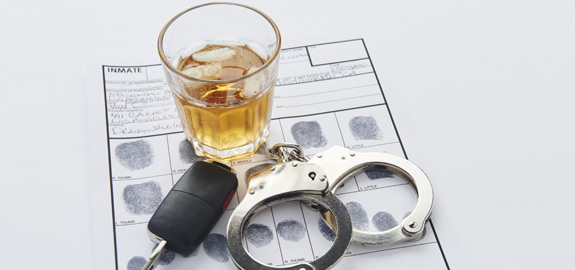
Whether called “driving while intoxicated” (DWI), “driving under the influence” (DUI), or “operating under the influence” (OUI), the crime commonly known as “drunk driving” has some serious penalties.
Given that, here are 5 things you need to know about a DWI, DUI, or OUI arrest or conviction. And what you can expect to happen afterward.
What happens when you get a DUI
1. The basics of driving while intoxicated aren’t that basic
A DWI, DUI, or OUI arrest means you’re caught driving a vehicle while “under the influence” of alcohol or drugs. And, it doesn’t always involve a car or a truck. You also can get a DWI while driving other vehicles like ATVs, golf carts, and even bicycles.
In many cases, a DWI starts when a police officer pulls someone over because their driving seems erratic or impaired. Then, the officer conducts various sobriety and chemical tests, such as the Breathalyzer, which measures blood-alcohol concentration, or BAC. These tests determine whether or not the driver is under the influence.
You can still get a DWI if you’re pulled over for some reason other than erratic driving, by the way. As long as your BAC is 0.08 percent or higher, you can be charged, even if your driving wasn’t affected.
Note: some states assume that any amount of alcohol or certain drugs in the bloodstream constitutes impairment.
2. DWI, DUI, and OUI aren’t always interchangeable
Whether “drunk driving” is officially referred to as a DWI, DUI, or OUI often depends on the state. In some states for example, only DWI is used. In others, DWI refers to people who drive under the influence of alcohol. While DUI is used to refer to people who drive under the influence of drugs. Also, some states use DWI if a driver’s BAC is over a certain limit. And use DUI if their BAC is below that limit. But some states sometimes allow DWI charges to be reduced to a DUI if specific conditions are met.
3. Don’t be surprised if your car insurance rates are raised as a result of a DUI or DWI
You can expect to pay more for car insurance due to a drunk-driving conviction. You’ll now be a “high-risk driver.” You may even have to shop around for a new car insurance company. Your current one could drop you once it learns about your conviction. Finally, your DWI conviction can affect your life-insurance premiums, too.
That said, insurance companies don’t all think the same way about driving while intoxicated. Nor do they treat all DWI convictions equally. So, if it was your first offense, your premium payments may not go up very much.
4. “Drunk driving” isn’t just about alcohol consumption
DWIs, DUIs, and OUIs aren’t only tied to driving under the influence of alcohol. Operating a vehicle after consuming other substances can result in arrest and conviction too. This refers to both illegal and legal drugs, including illicit, prescription, or over-the-counter drugs.
5. DWIs usually aren’t felonies, although there are exceptions
Most first offense DWIs, DUIs, or OUIs are misdemeanors and not felonies.
However, some situations cause even first-time DWIs to be felonies. For example, if you kill or severely injure someone while driving under the influence, that’s a felony. It’s also a felony if you’re caught with a very high BAC. And if your license was restricted, suspended, or revoked before the incident.
Also, in some states, your third or fourth DWI can get you a felony charge. And that’s even if no one was harmed as a result.

